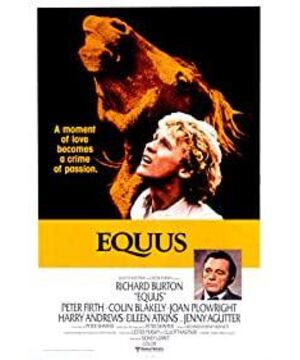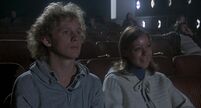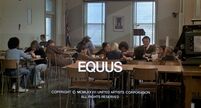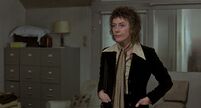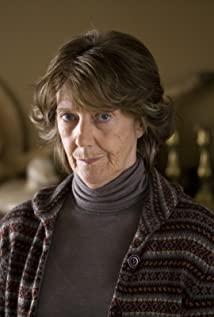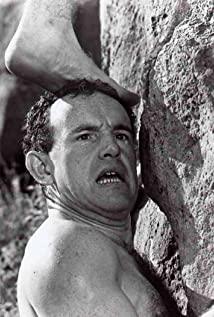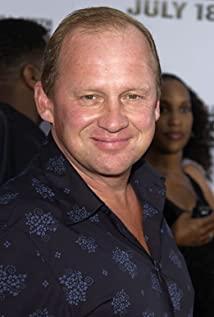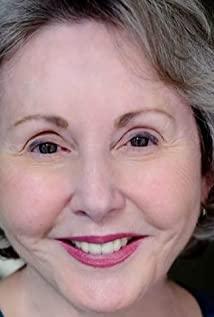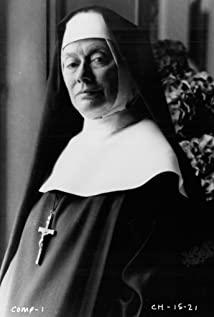17-year-old Alan was sent to psychiatrist Martin after stabbing six horses blind. During the conversation, Allen's fanatical love and hatred for horses made Martin also affected. He kept asking Allen and questioning himself. Is the spiritual home of people in the commercial society desolate and barren or colorful? When repressed, do you choose to run freely or follow tame? When there is a conflict, is it to challenge and fight or to give up oneself? Was Alan's stab at a horse callous or confused?
The plot of the movie follows the order in which Allen grew up.
Alan, 6, is building his castle on the beach.
He thought there was no strong glue in a solid building. like his family. When his parents were entertaining Dr. Martin, the two couples were sitting face to face at home. As far as their stance on their children, the way they educated them, and the way they concealed their true feelings, they were always on opposite sides.
Mother used to restrain herself, even when she was emotionally broken, she still did not forget to force herself to smile. She preached to Ellen the love of divinity, the love of asceticism in Christianity, and natural sex is indulgence and sin, which can only be redeemed by self-punishment. And when Alan conforms to his own nature, he is cursed to be a fallen devil, and he completely denies everything about him without understanding. She lives in religious principles that she doesn't quite understand.
Relative to his mother's cowardice, Allen's father was authoritarian, authoritarian, rude, ignoring and avoiding his son's emotional affairs.
Parents are in an authoritative position over their children, and supervision and restrictions are out of protection. They are worried about the impact of the external world on their children, and they are also afraid of losing their sense of superiority and control. And categorical isolation, amplifying the evils of human nature and erecting barriers that insulate the society, leaving children in a state of ignorance to maintain their innocence is pedantic and backward.
Alan, who has no friends, is attracted by live horses. A child longing for a break from loneliness tries to touch a dark horse and feel a living animal. The encouragement of the black knight released Allen's freedom, freedom and even indulgence, to control and control powerful forces, and to feel the ability of self-distribution. "Take me away" he was guided to shout, speed, passion, danger, relative dryness, boredom and restraint are undoubtedly full of temptation and attraction.
And his parents were afraid of his self-awareness, so they pulled away and even hurt him. Allen's father attributed the circling horses to a "dangerous" breed. Just as he tore up the picture of Christ, he did not allow any substitute parental authority to appear. For Ellen, horses are not only creatures that he likes to get close to, with soft fur, scorching body temperature, and an iron chain that creates pain in his mouth.
Under the influence of his mother telling the same religious story over and over again, 12-year-old Allen rebelled against human nature and suppressed and bound the budding sexual consciousness of youth, believing it was a sin, and tortured his body in front of the horse that ruled and supervised him. He disguised himself as a horse, with a rein on his head, and beat himself with a wooden stick, desperate for relief from his pain. Through physical pain to eliminate desire, imprison the spirit, in order to seek redemption and self-discipline.
Doctor Martin also saw many wild animals and dignified figures staggered on the wall of Allen's room. This seems to allude to the chaotic state of youth seeking inner freedom and obeying authority.
The unity of the knight and the horse is a combination of perfect ideals and spiritual freedom. The film repeatedly emphasizes that the two are inseparable. And Allen couldn't distinguish the two, and even lost himself in confusion.
The 17-year-old Allen has not received the education he deserves under the selfish parenting. He is incapable of reading, cannot watch TV except for advertisements, has no historical knowledge except for the mother's forced stories, and has no knowledge of physical engineering biology and so on. During the first meeting with Dr. Martin, he kept singing Green Arrow Gum, Martini, Doctor's Tea and other commercials. This is another aspect to show the monotony and lack of Allen's spiritual world.
Martin continued to use the words religion, education, and memory adorned with blood. When he dreamed that he became a big sacrifice to kill children with a blade, he subconsciously questioned the meaning of what a psychiatrist did, but the budding of a little bit of resistance, some behaviors that strayed from the mainstream consciousness, caused him to wake up in panic and fear. coming.
Martin also communicated with Allen from envy of his closed and lonely self to understanding his mental pain, and then torturing the meaning of self-existence, questioning his real life and work, but unable to find a way to break free.
The constant questioning in Martin's world is the rights given to him by his profession, to control other people's emotions to force others to admit it, and to spy on other people's privacy. He envied Allen, and vehemently believed that Allen had created the pain himself, and the release of his passion would have to pay the price of torture.
This is also the envy most adults have for young people. The dynamic and fearless adults who are bound by social rules or play with them and benefit from them can no longer resist without it.
Just like Dalton, the racecourse owner, when he walks around the sofa excitedly, doesn't it look like a horse jogging around the field? The reins are in control of the direction. He is angry and regrets his lack of alertness and lack of attention, and the shaken confidence will forever affect the trust in others in the future. This is the teaching of the social classroom.
Allen and Martin confront each other during therapy. For the doctor's question, Allen went from being silent to a non-topic reply (singing), and then denied and avoided the question, and then exchanged secrets one-on-one.
Of course, as an adult, Martin cunningly used tricks. He saw that Allen was eager to be understood and communicated, so he prescribed a "placebo" (a medicine without pharmacological ingredients prescribed to patients in the name of a therapeutic effect) ¬- "truth medicine".
Allen recounted his past uncontrollably.
Especially bridle the horses and lead them out secretly at night. Before riding a horse, he will feed sugar cubes, and let the horse of faith in his heart and himself perform the ritual of swallowing his sins. It is worth mentioning that "E" or "A" are written on each side of the sugar cube, which should be the initials of "Equus" (Latin for horse) and "Alan" (Alan's name). with the rite of rebirth.
Allen scolded that electrical appliances and kitchen utensils have become garbage in the commercial society, and horses are paramount. Rebellion and confrontation are carried out alone in the dark night, Ellen seeks spiritual and sexual freedom by riding a naked horse. Ironically, the harness is the first thing to go out. No matter how naked his body is, his spiritual world has been bound, how can he run away freely. His thoughts were stifled by the teachings of Christ, and even if he met the beautiful girl frankly, he could not escape the invisible guilt. He tried to get rid of the spiritual oppression by stabbing the eyes of the blind horse, but he ignored that the horse was originally a god The materialization of sexuality, the world of sin and punishment that is the perfect and supreme in his heart is the real cage, the broken faith.
There are a lot of comparison shots in the movie.
A comparison of the two pictures in Alan's room, Christ's long hair under the crown of thorns and the mane under the horse's bridle, Christ's handcuffs and the bit and bridle in the horse's mouth, Christ's sorrowful eyes and the white horse's wet eyes eye. Allen sees Christ as the divine and the horse as the divine reification, the most beautiful living love that can be touched and felt. And the horse is also an almighty God-like existence, and he will always pay attention to him and supervise him all the time. It is a more authoritative existence in Allen's heart than his parents.
The front of the two slow-motion shots is Allen riding a horse and screaming against the system of the commodity economy, and the latter is stabbing the horse's eyes in the stable. The sharp dagger appeared in the stop-motion shot at the beginning of the film, and the lofty beliefs may be the culprit that split the bloody story.
Ellen passes vegetable fields and ponds at night. Once with the horse, galloping forward under the starlight; once with the girl Jill side by side. Like a cabbage field where children are squatting, a pond swaying in the moonlight, and a light blue stable exterior wall under the mottled light and shadow, the way to leave is the same as the way back, but the partners are different. The person and the horse that Allen loves in his heart cannot be spiritually unified, and become the one that his mother called the knight and the horse. In the end, the boy went mad.
Allen gave Ma and Jill the same compliment - "beautiful and moving".
The reactions of different people to the same behavior, consciousness, or object in a film.
Allen's denial in therapy can be seen as a conditioned reflex for self-preservation. It's like he was yelling "no" unconsciously when he was attacked by his father.
Martin's denial and avoidance is a refusal to introspect, to see his own heart.
Allen's father went into a pornographic movie theater to meet his son and lied, and his feeble defense was nothing but an attempt to restore the family's authority. Alan clearly saw his father's sanctimonious appearance, and for the first time rejected his father's opposition to authority in person. This is the beginning of young people to have independent thinking and independent personality.
The "chain" in the horse's mouth is called the "horse's mouth bit", which is a harness to correct the direction of the horse's travel, and it will also cause the horse to suffer a certain amount of damage.
For Ellen, this is a heavy shackle of doctrine and morality, and it is the price of adulthood. It is like a tree that grows arbitrarily is pruned. To escape from a painful situation, you will inevitably experience injury or harm, and the innocent and clear eyes will gradually slow down. Accident and cloudy. The pain caused by the "chain" is the price of redemption.
Martin kept asking "why me". In the treatment of Allen, he thought about the erosion of the human spiritual world by business society, but he was unable and unwilling to change it. His "chain" cannot be removed. Just like at the beginning of the movie, psychiatrist Martin is the listener, bystander, crusher, commander, pleaser, castrates the patient's mind, is a gentle leader, and cures the rebellious patient into a social "normal" stateful person. Under the broken belief, he was unwilling and had to continue the work that the society needed.
Film actor, director and screenwriter.
Richard Burton, who plays the doctor, has a lot of monologues, mostly close-up shots. His expressions and eyes are clearly displayed on the screen. He is either quiet, or depressed, or confused, or his painful emotions render the atmosphere of the film.
And Peter Firth, who plays Alan, is clumsy and naive. When taking medicine, when he is dealing with the frenzy of riding a horse, his waist is slightly stiff and his entire upper body is shaken when he walks. This kind of childishness comes from children. The performance of a 17-year-old boy who is still ignorant makes people feel pity and love.
Director Sidney Lumet's first film was "Twelve Angry Men". At that time, he saw indoor shooting. The atmosphere was driven by heavy rain. The dialogues of the characters were full of tension and emotional changes. The whole film was smooth and compact, with conflicting turning points. Climax after another, worship for a long time.
The screenplay of the film is "God's Favorite" ("Mozart Biography") screenwriter Peter Shaffer.
The performance of the film "Footprints", which also has only two male protagonists, is even more exciting. No matter the dialogue or plot is more tense, the conflict is more intense, and the pictures of the two people do not feel monotonous or isolated.
In addition, I deliberately found the drama video of "Horse Love" as a comparison.
Film is to lead the audience into a spiritual world, a world isolated from reality.
The drama is different. There is no special lens to show it. Every pair of audience's eyes is a lens. To pursue the perfect performance, it is really tested in all directions, and the lighting and scenery are very particular. The performance without the N machine is really a test of skill. No wonder British actors who are competent on the stage always exude a more outstanding temperament in the movie.
And speech is the speaker's initiative to enter the world of the listener to form a real world of docking.
View more about Equus reviews


